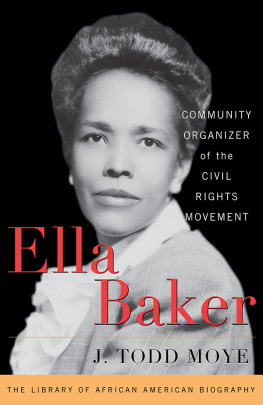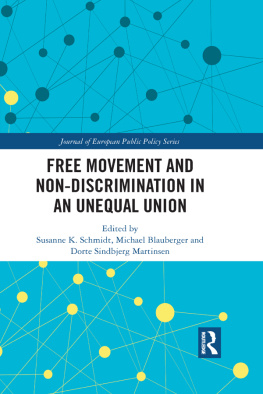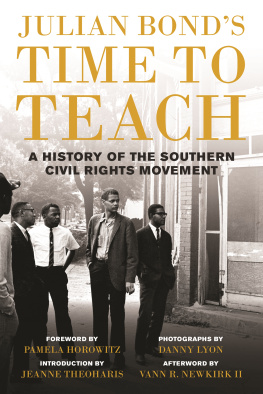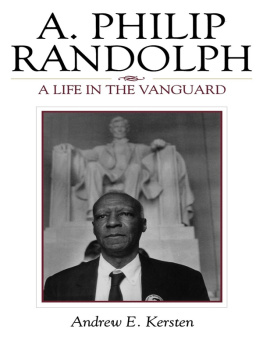You Cant Eat Freedom
This book was published with the assistance of the Fred W. Morrison Fund of the University of North Carolina Press.
2016 The University of North Carolina Press
All rights reserved
Manufactured in the United States of America
Set in Charter and Block types
by codeMantra
The University of North Carolina Press has been a member of the Green Press Initiative since 2003.
Cover illustration: Residents of Mound Bayou, Mississippi, on their front porch, 1976. Alex Webb / Magnum Photos.
Library of Congress Cataloging-in-Publication Data
Names: De Jong, Greta, author.
Title: You cant eat freedom : southerners and social justice after the Civil Rights Movement / Greta de Jong.
Description: Chapel Hill : The University of North Carolina Press, [2016] | Includes bibliographical references and index.
Identifiers: LCCN 2016014539 | ISBN 9781469629308 (cloth : alk. paper) | ISBN 9781469629315 (ebook)
Subjects: LCSH: Southern StatesEconomic conditions1945 | African AmericansSocial conditions19641975. | African AmericansEconomic conditions. | AgricultureEconomic aspectsSouthern States. | Southern StatesHistory1951 | Migration, InternalUnited StatesHistory20th century.
Classification: LCC HC107.A13 D426 2016 | DDC 331.6/396073076dc23 LC record available at http://lccn.loc.gov/2016014539
Contents
Maps, Illustrations, and Tables
MAPS
1. Louisiana Cotton Plantation Region /
2. Mississippi Cotton Plantation Region /
3. Alabama Cotton Plantation Region /
ILLUSTRATIONS
Map prepared by the Citizens Council accompanying an article in the Citizen, May 1962 /
Pamphlet inviting poor people to a conference at the Delta Ministrys headquarters in Mt. Beulah, January 1966 /
Cartoon noting the federal governments shift in focus away from the War on Poverty to the Vietnam War, November 1967 /
Poster encouraging people to form cooperatives, late 1960s /
President Richard Nixon meeting with advisers in the Oval Office, 13 March 1970 /
Fund-raising advertisement from an Emergency Land Fund newsletter, December 1979 /
Cartoon on President Ronald Reagans budget cuts, early 1980s /
TABLES
1. Agricultural and nonagricultural employment in the plantation counties, 19501990 /
2. Black unemployment and poverty rates in the plantation counties, 19501990 /
Acknowledgments
I am fortunate to be part of an inspiring and supportive academic community at the University of Nevada, Reno, and in the wider field of southern and African American history. My colleagues in the Department of History, the Core Humanities Program, and the Gender, Race, and Identity Program at UNR have been vital allies in my intellectual endeavors, and I am grateful for numerous opportunities I have had to share ideas and receive feedback from them at organized events and in casual conversation. I am especially indebted to Debbie Boehm, Scott Casper, Linda Curcio, Dennis Dworkin, Neal Ferguson, Justin Gifford, Martha Hildreth, Jen Hill, Emily Hobson, Meredith Oda, Daniel Enrique Perez, Elizabeth Raymond, Hugh Shapiro, Charles Tshimanga-Kashama, and Barbara Walker for their astute observations and enthusiastic encouragement of my work. Jenni Baryol and Jodie Helman provided much-appreciated administrative assistance. Research for this book was partially funded by a Junior Faculty Research Grant from UNR and by the John and Marie Noble Endowment for Historical Research.
My mentor and friend Nan Elizabeth Woodruff has continued to offer excellent guidance on matters both scholarly and unscholarly with her inimitable energy and good humor. I owe her everything. Pete Daniel has been another valued adviser whose work on race and labor in the southern plantation economy has strongly influenced my own. Over the years I have participated in various conferences and other forums where I was able to present portions of my research in nascent forms and interact with other scholars in my field who helped hone my analysis. In particular, I would like to thank participants at the Region, Class, and Culture Conference in Memphis (2009) and the War on Poverty Conference at Dartmouth College (2011) for their insightful questions and comments on my papers. V. P. Franklin, Michael Martin, and Annelise Orleck and Lisa Hazirjian edited journals and anthologies where some early articles appeared. Their comments and those of the peer reviewers of those works helped shape the direction of the larger study that became this book. Special thanks also to Annelise Orleck and the other (anonymous) reviewer for the University of North Carolina Press, who carefully read the draft manuscript and whose insights dramatically improved the final version presented here. My editors at UNC Press, Brandon Proia and Mary Carley Caviness, also offered invaluable advice, encouragement, and support as I worked on revising and preparing the manuscript for publication. Nancy Raynors careful copyediting added clarity and eliminated many mistakes.
I am grateful to the leaders and members of the Federation of Southern Cooperatives for their continuing efforts to bring racial and economic justice to the South in the decades following the civil rights movement and for ensuring the preservation of the organizational records deposited at the Amistad Research Center in New Orleans, which provided much of the archival material used in this book. Thanks especially to Wilbert Guillory and John Zippert, who agreed to be interviewed for my research on the Louisiana freedom struggle some decades ago and who provided information about the southern cooperative movement that helped inspire this project. I had planned to conduct more interviews after completing an initial draft of the manuscript based on the archival research, so that I could direct my questions toward gaps in the record that needed to be filled. However, the project took much longer than expected to complete, and in the meantime many of the older activists fell ill or died, while those who remained involved in the movement tended to be extremely busy. Fortunately, I was able to draw on interviews conducted by scholars Robert Korstad and Neil Boothby that they generously shared online through the Southern Rural Poverty Collection at Duke University, and I am indebted to them and to interviewees John H. Brown Jr., L. C. Dorsey, Leslie W. Dunbar, H. Jack Geiger, John Hatch, F. Ray Marshall, and Charles Prejean for creating these oral histories. I owe a similar debt to Susan Youngblood Ashmore for kindly sending me a copy of the transcript of her interview with Ezra Cunningham.
Many thanks also to the helpful archivists and staff of the depositories I visited during the course of my research: the Special Collections and Archives Department of the Draughon Library at Auburn University, Alabama; the Hill Memorial Library at Louisiana State University; the Wilson Library of the University of North Carolina; the Charles W. Capps Jr. Archives and Museum at Delta State University; the McCain Library and Archives at the University of Southern Mississippi; the Wisconsin Historical Society; the Amistad Research Center and Tulane University Special Collections in New Orleans; the University of Mississippi Archives and Special Collections; the Special Collections Department and the Congressional and Political Research Center of Mississippi State University Libraries; the Rockefeller Archives Center in New York; Special Collections at the Hoole Library of the University of Alabama; and the National Archives in Washington, D.C. Their knowledge, expertise, suggestions, and insights proved invaluable to me during my time in the archives and helped uncover sources that I might not have thought to look at otherwise. I also thank the archivists at the University of Mississippi, the University of Southern Mississippi, and Mississippi State University for their fast responses to my requests for digital copies of the illustrations used in the book.
Next page







